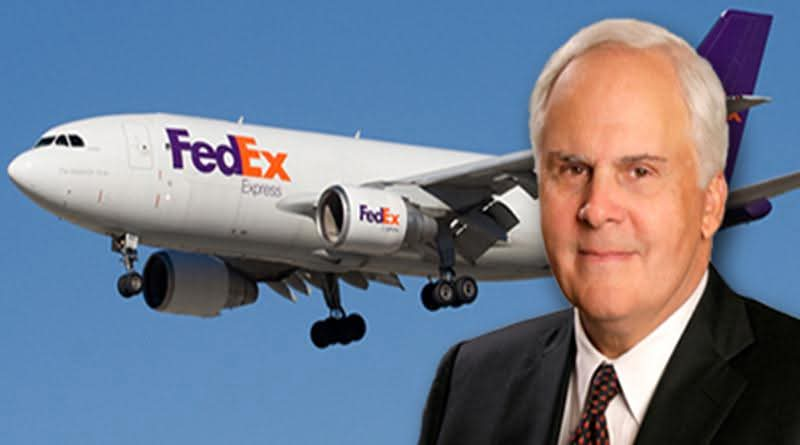In 1965, a Yale economics professor handed a young Frederick W. Smith a paper graded with a “C.” The topic? A revolutionary idea for an overnight package delivery system that would become the foundation for one of the most recognizable companies in the world.
“It’s not feasible,” the professor reportedly said.
Fred Smith didn’t argue. He simply filed the paper away. Eight years later, that paper would become FedEx, a $5,000 bet away from oblivion and ultimately a $90 billion behemoth that forever altered global logistics.
Smith, the Marine Corps veteran who founded FedEx and pioneered the hub-and-spoke model for shipping, died on June 22 in Memphis at the age of 80.But what he left behind was more than a corporation, it was an idea that reshaped how business is done worldwide.
Born in Marks, Mississippi, in 1944 and raised in Memphis, Fred Smith had a rough start. His father died when he was just four, and Smith grew up with a hip disorder that required braces. But by high school, he was playing football and flying planes. At Yale where he studied Economics, he rubbed shoulders with future U.S. presidents, including George W. Bush, who later called him “one of the finest Americans of our generation” in his memoir “Decision Points”.
After college, Smith joined the Marines and served two tours in Vietnam as a combat pilot. He saw death. He saw chaos. And he saw the value of coordination and precision. “Everything I did running FedEx came from my experience in the Marines,” Smith told the Associated Press in a 2023 interview. “Not from Yale.”
When Federal Express launched in 1973, it was a leap off a cliff with handmade wings. The company would deliver urgent packages overnight using a central hub, in Memphis, of all places.
That vision almost died early.
Burning through cash at a dangerous pace, FedEx was days away from bankruptcy. Investors said no. Banks turned cold. With just $5,000 left in the company’s account, Smith did something audacious: he flew to Las Vegas.
“I couldn’t just let the company die,” he once explained. “So I gambled.”
At a blackjack table, Smith won $27,000, enough to buy fuel and keep the planes flying for one more week. That week bought time. Time bought investors. And investors bought into what would become a global empire.
FedEx didn’t just deliver packages, it delivered a new vocabulary. “FedEx it” became shorthand for reliability. Smith’s hub-and-spoke model, which inclided planes flying into a central hub at night, then back out to destinations, revolutionized air freight. Competitors scrambled to mimic it.
He invested early in bar code tracking, and eventually a global supply chain so sophisticated that it became the lifeblood of modern commerce.
By the early 1980s, FedEx had reached profitability. By the end of the 1990s, it was delivering millions of packages a day to over 220 countries. Today, FedEx operates the largest fleet of cargo aircraft in the world.
Smith was more than a businessman. He was a Marine until the end. Disciplined and committed to country, when the U.S. needed help during the COVID-19 pandemic, FedEx flew critical medical supplies. When a Russian prisoner swap required delicate logistics, Smith offered up a FedEx jet.
He was offered the position of U.S. Secretary of Defense not once, but twice by President George W. Bush. He declined both times, out of loyalty to his family and company.
He avoided the public spotlight but quietly became one of America’s most generous philanthropists. He gave millions to the Marine Corps Scholarship Foundation, to Yale, and to the University of Memphis. “If you’ve done well in this country, it’s churlish not to give back,” he said.
Smith’s life was not without turbulence. In the 1970s, he was indicted over an alleged fraudulent loan application, charges he was surprisingly acquitted of. He was involved in a hit-and-run accident that left a man dead, charges later dropped. And early lawsuits from his half-sisters accused him of misusing family trusts to prop up FedEx.
But he survived each storm. His charisma earned loyalty even in hard times. When FedEx faced losses during the 2008 financial crisis, he cut his own salary by 20%. And while he fought unionization efforts fiercely, he maintained a no-layoff policy.
Fred Smith stepped down as CEO in 2022, after nearly 50 years at the helm. By then, FedEx had grown into a $90 billion enterprise with over 500,000 employees and an average of 17 million shipments per business day.
Do you want to advertise with us?
Do you need publicity for a product, service, or event?
Contact us on WhatsApp +2348033617468, +234 816 612 1513, +234 703 010 7174
or Email: validviewnetwork@gmail.com
CLICK TO JOIN OUR WHATSAPP GROUP
He left behind more than wealth (estimated at $5 billion) or a company. He left behind a blueprint: think big, act boldly, and never underestimate the power of a well-executed idea, no matter what grade it gets.
He is survived by his wife Diane, nine children, 31 grandchildren, and two great-grandchildren. His son Arthur coaches in the NFL. His daughter Windland, a nature photographer, passed away in 2005.
Fred Smith also made a cameo in the film Castaway, a nod to the brand he built. But the real movie was his life; a drama of grit and relentless execution.
In an era where entrepreneurs talk loud and gamble with other people’s money, Fred Smith played it all on his own hand. And when the chips were down, he doubled down on belief, and won.Goodbye Fred Smith.






